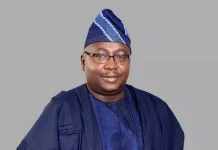
By Abujah Racheal
the Special Adviser to the President on Health, has said that President Bola Tinubu administration’s healthcare reform agenda will be defined by making Universal Health Coverage a priority.
Anas said this on Wednesday in Abuja at a Health Policy Dialogue.
The theme of the event was “Setting UHC and Health Security Priorities in the New Dispensation: Getting it Right from the Outset.”
The News Agency of Nigeria (NAN) reports that the dialogue examines Nigeria’s health policy priorities in the light of the Presidential Committee on Health Reform’s-recommendations and the citizens-led health agenda and charting a course of action.
The special adviser said the President’s objective was to bridge the divide between the underprivileged and accessing quality healthcare by providing financial security.
Dr Betta Edu, APC Women Leader, commended the current administration for its initiative in removing fuel subsidies.
Edu said the president was committed to redirecting the resources to subsidise every household, through prioritising investments in the health and education sectors.
Dr Haliru Yahaya, Emir of Shonga in Kwara, said the improvement of the country’s health system relied greatly on political will and a change in attitudes.
Yahaya said that those two elements were crucial in driving positive change and progress in the country’s health sector.
Dr Walter Kazadi Mulombo, WHO Country Representative (WR) to Nigeria, said that getting it right from the outset started with putting the right people in the right place.
Kazadi said that WHO acknowledged the invaluable role of community involvement in shaping health policies.
Dr Rob Yates, Executive Director, Centre for UHC, Chatham House, again emphasised how political commitment was critical for achieving UHC in the country.
Yates said that the Chatham House is willing to support the new state governors in advancing the UHC agenda in the country.
Mrs Chika Offor, the Chair of Health Sector Reform Coalition (HSRC), urged the new government to work with a sense of urgency, to address the poor health outcomes in the country.
Earlier, Mrs Moji Makanjuola, Chair of UHC2023 Forum, said it was sequel to the emergence of a new political dispensation in the country.
Makanjuola said that the UHC 2023 Forum would intensify its engagement with the political class to ensure their health policy priorities reflected the most important gaps in the health system.
“Today’s event is one of such endeavours that is aimed at articulating available evidence on policy reforms in Nigeria and forging a consensus on health and health security priorities in the light of available evidence.
“This gathering also offers us the opportunity to identify key success factors for achieving health and health security reform objectives, especially in a complex administrative setting like ours.
“Furthermore, this forum comes with a unique opportunity to chart a course of action for effective and sustained citizens’ engagement towards productive health reforms,” she said.
The forum is a coalition of a wide array of stakeholders, including donor agencies, development partners, Civil Society Organisations and the Media.
The UHC 2023 Forum as an entity, committed to taking advantage of the policy window created by the political transition, to put UHC and health security on the political front burner.
The forum has formed a robust partnership with a global policy think-tank, the Chatham House UK and the Nigeria Governors’ Forum, to raise the political profile of health in the country.
The forum creates a citizens-led health agenda for participation by major political parties in the country. (NAN)
Follow Us On WhatsApp



